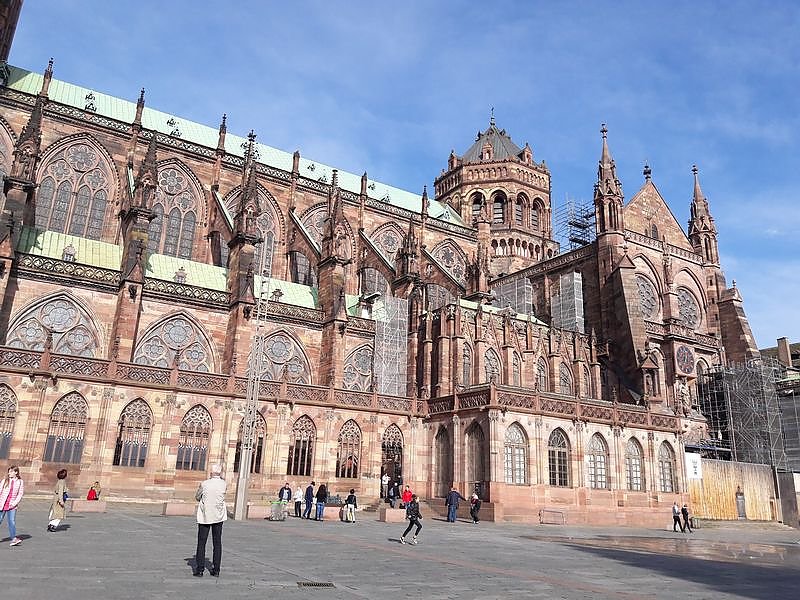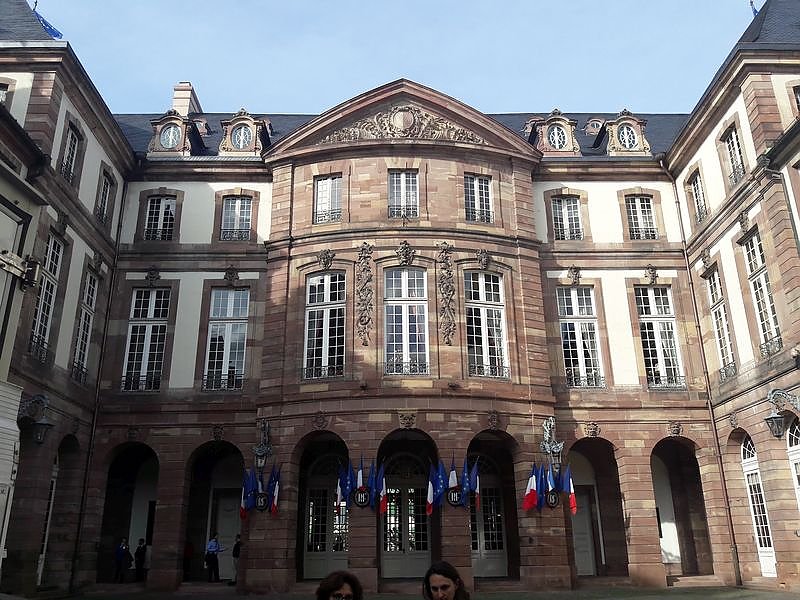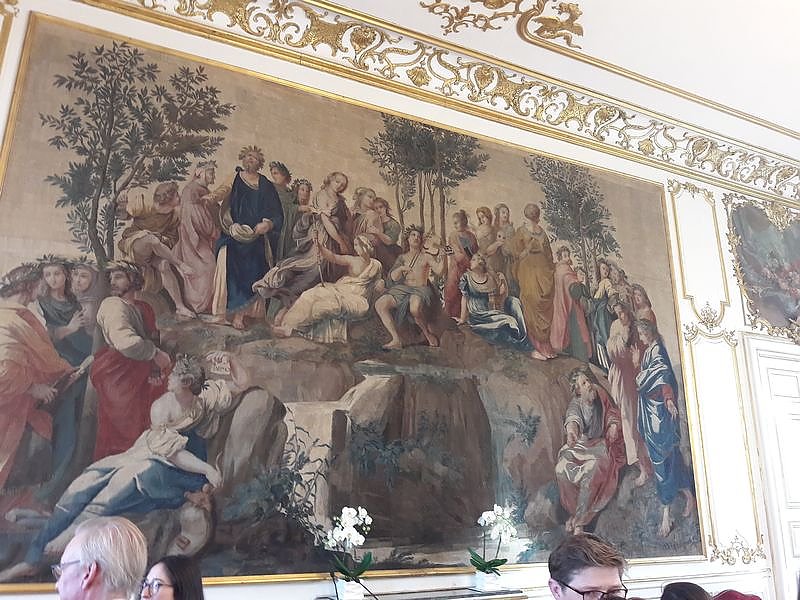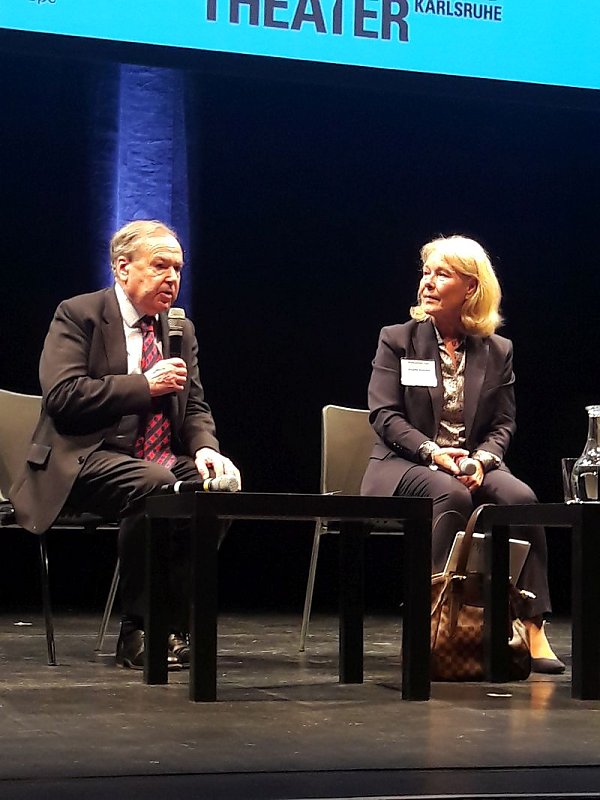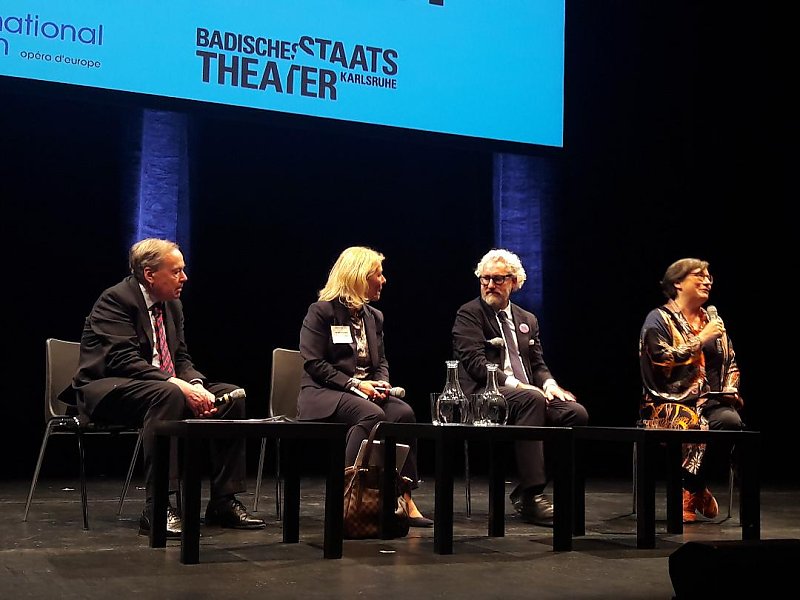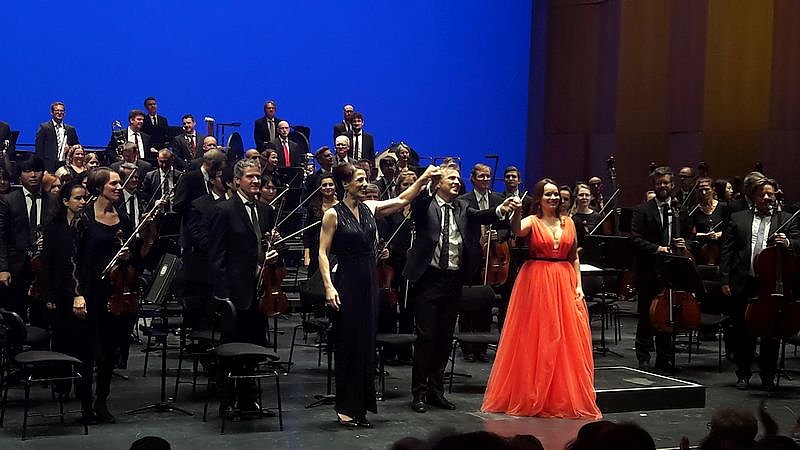Strasbourg and Karlsruhe: Autumn Conference of OPERA EUROPA “Building Bridges” or: How the opera will / could continue… - 24.-27. October 2019
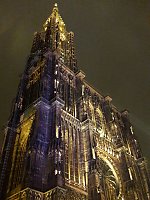
Strasbourg Münster
Last year's autumn conference of OPERA EUROPA took place in Strasbourg and Karlsruhe from October 24-27, 2019. According to Nicholas Payne, long-time director of the organization, the conference was initiated by late Eva Kleinitz (1972-2019), the two-year director of the Opéra, who died in May 2019. The conference was carried out in her memory and presented an interesting brochure for her obituary.

Strasbourg Münster
The conference brought together around 280 representatives of opera companies, opera specialists, cultural politicians, artist agencies, consulting firms, artists et al., as well as opera-related institutions from 33 countries, 25 of them from Europe and eight non-European, i.e. the United States, Canada, Chile, Israel, India, China, Japan and South Africa. OPERA EUROPA is a kind of umbrella organization for opera companies and festivals all over Europe. The organization currently supports over 200 companies from 43 countries and is registered as a non-profit cultural organization under Belgian law with its headquarters in Brussels, Belgium. There are also OPERA AMERICA and OPERA LATINOAMERICA. The Asian opera world has not yet founded an umbrella organization.
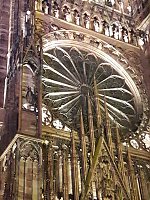
Portal of Strasbourg Münster
The topic of the conference was “Building Bridges”, which was used to discuss the bridge building functions and qualities of the opera as an art form on the basis of various topics in panels by international panelists, with a special focus on the future development of the opera and the acquisition of new visitor groups. Very interesting considerations of positive and negative nature came to light, which I think will be of great relevance for the continuation and survival of the art form in the coming decades (one even spoke of the next 100 years!). Thus, my article is based on this OPERA EUROPA conference. However, I can only write about the panels in which I was able to participate, since some events ran in parallel or overlapped and understandably, as a press representative, I could not be present in the internal meetings of the organization. However, I visited what I think are the most interesting panels for our readers.

Main Hall of Strasbourg Münster
The conference also took place on the occasion of the First “World Opera Day” which was announced by OPERA EUROPA as part of the “First World Opera Forum” in Madrid in April 2018. The day was ushered in a panel called “World Opera Day”, in which Ernesto Ottone from UNESCO; Marc Grandmontagne from the Deutsche Bühnenverein; Tobias Biancone from the International Theater Institute-ITI, founded by UNESCO in 1948; Marc Scorca, CEO of OPERA AMERICA; Nicholas Payne, Director of OPERA EUROPA; Jiachen Zhao, Vice President of the National Center for Performing Arts-NCPA Beijing; Christina Loewen, Executive Director of opera.ca in Canada, and others gave lectures. It was primarily about the role of opera in today's society and its future challenges.

Münster square
Ernesto Ottone emphasizes that the opera can often be linked to the restoration of cultural sites and that especially young people are interested in it. In this regard, UNESCO is currently working in Mosul/Iraq. People from different social classes often come together for an opera event. There is also no special intellectuality required to understand opera, because most of the visitors do not understand the language in which the librettos are written anyway and still enjoy an evening that is usually emotionally moving and therefore profitable. Marc Scorca emphasizes that opera must arouse curiosity and arouse interest. Opera companies should show how a community wins with an opera, inside and outside the opera house. Opera can inspire, promote individualism – it is a universal art form! For Nicholas Payne, Germany continues to be the opera's powerhouse. Marc Grandmontagne informs that the over 80 opera companies in Germany all too often have to do with politics, especially because of the finances/subsidies to find a way into the future. It is particularly difficult to develop new visitor potential. In the season 2017/18, the German opera world lost a significant number of visitors and was on the same level as seven years ago! The interest of the audience in Germany in opera is decreasing. This results in the main task for the future: winning new visitor groups! You must convince them that the art form is about humanity, about empathy, that you don't have to play a role, just observe and learn from what you have experienced on stage. Opera can build bridges here, bring people together. Tobias Biancone only presents the ITI and its tasks in this panel.
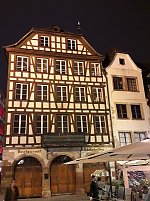
Old Town
The panel “Renovation or New Building” is concerned with the extent to which an opera company can play a constructive role in the urban context. Many houses that were rebuilt after the Second World War due to their destruction are now in the years of necessary renovations. In the case of new buildings, but also in the case of larger renovations associated with certain conversions, it is emphasized that the houses should be provided with more space, more open space, in order to make them more transparent and more easily accessible. One used to say that “the theaters were dinosaurs in an urban context”. This should be over now. In order to attract new audiences, the opera house must become more attractive and permeable, dispelling any form of fear of contact.

Old Town
The subsequent “Opening the Building” panel also alludes to this topic of how new buildings of a futuristic nature, but sometimes also arising from old industrial premises, can contribute to urban development. Examples include: The Factory of Manchester; the Theater Factory in Dresden; the new library in Helsinki, built like a bark; the Arena Sferisterio di Macerata, where the annual Macerata Opera Festival takes place, and which has a far wider range of activities. There is often dance on stage after the opera, such as a flamengo performance. There are cocktail receptions etc., so that the audience stays much longer than just for the opera performance itself. Finally, the incomplete renovation of the Teatro Donizetti in Bergamo is mentioned, which will also bring completely new features in this sense.
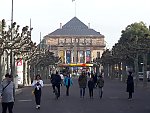
Opéra national du Rhin
Nicholas Payne then presents the biennial report for Opera Vision, a new streaming platform that replaces The Opera Platform from OPERA EUROPA. This new platform offers enriching content, created from diverse cooperation. The number of theaters in partnership with the stream platform has doubled to 30, and 60 percent of the partners are new. The content should be more varied (full and short form), inclusive (varied music theater) and more regular (an average of two new streams per month). Opera Vision has no login, no subscription, no payment, no ticket. There are already 1,000 subscribers. The platform should also perform educational functions in the sense that it leads young people to the opera.

Front of Opéra national du Rhin
The panel “Alternative business models” is about whether the opera companies should change their current business practice in order to particularly interest young people in the opera and its surroundings and to attract them as a new audience. Marc Scorca emphasizes that the focus should get away from pure performance. As part of a visit to the theater or opera in the USA, getting together with family members and friends and the gastronomy, in connection with the performance are becoming increasingly important. Keyword: “To enjoy also food and beverages”. Since there is a clear trend here, one should take this into account in future planning, also creating gastronomic offers that make an opera evening a more comprehensive experience. This would also appeal to new groups of visitors who not only come for the performance, but also want to enjoy the social get-together with friends and family, possibly at a dinner after the performance.

First World Opera Day 25.10.2019
Jiachen Zhao presents the activities of the National Center for the Performing Arts – NCPA in Beijing/China in general and in particular on the 1st World Opera Day, for which an exhibition was also set up. For the NCPA, social media are becoming increasingly important to address young visitor groups. Today 80 percent of the tickets are sold online. There are many events around the actual performance, especially opera films, and the audience is offered free rehearsals. 20 live streamings per year as well as lectures are further offering. There is already a live streaming agreement with the Vienna State Opera. NCPA also goes to rural areas, schools and hospitals with the NCPA programs and tries to involve young people. Due to these activities, the average age of visitors to the NCPA is unusually low. They have become a driving force in the growing Chinese classical music and opera life. Of the 360,000 members of the NCPA, 69 percent are under 45 years old, 31 percent are over 45, and students make up 14.3 percent of the members. Most members are with about 100,000 lovers of symphonic music, followed by musical theater and dance. Special opera lovers currently make up about a sixth of the members. The NCPA currently has 1.8 million visitors per annum.

Start of the conference
Gian Galeazzo Ganzarolli then speaks as Artistic Advisor to the National Center for the Performing Arts – NCPA in Mumbai (formerly Bombay), India, which shows 600 performances in five theaters per annum. His chairman Suntook started the center in 2004 and founded the first orchestra in 2006. They have already performed “Tosca”, “Madama Butterfly”, “Cav./Pag.” and others and streamed “La Bohème” on Opera Vision in 2017. Sponsors are an essential part of this business model, especially since the government has cut subsidies significantly, since only Western classical music and operas were played, thus no Indian music. The NCPA maintains a chamber orchestra of around 30 musicians. With their tuition fees, the students bear 60 percent of the costs of this chamber orchestra and thus receive it all year round. A large orchestra cannot be financed. Twenty of the chamber orchestra's musicians are also teaching the students. Of the 1.5 million inhabitants of Mumbai, only about 100,000 Parsis are preferring the opera. They largely belong to the middle class. The average price of a tickets is 3,000 Rupees, around € 38. The famous Bollywood is a strong competitor to the opera. Ganzarolli also sees a possible connection between Bollywood films and the opera.
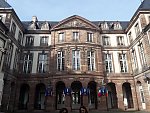
The Mayer's House of Strasbourg
Finally, John Berry from Opera Ventures presents a completely different business model. After leaving the English National Opera-ENO, he devoted himself to a form of production that as a charity company relies exclusively on the donations of philanthropists. And it works very well! They have been a guest at the Edinburgh Festival and seven to ten co-producers worldwide. The whole point is that Opera Ventures has no fixed costs that would make the business model impossible at around £ 10,000. This business model reminds me a little of that of Angelo Neumann, who traveled across towns with Wagner's “Ring of the Nibelung” in 1882-1883 …

Reception at the Mayor's House
In the panel “Where will tomorrow’s opera take place?” on the second day of the conference in Karlsruhe, topics with a special outlook on the future of opera in the coming decades were discussed. Most interesting were the statements by Christina Loewen from opera.ca in Canada. Of the 15 theaters, which are essentially multidisciplinary, which also make operas, only one was specifically designed and built as an opera company, the Canadian Opera Company in Toronto – COC. Everyone else has already moved far from the understanding of opera performances fixed to the opera house and offers visitors, especially the younger ones, an unconventional, wide-ranging and easier access to their opera programs than houses in Europe.
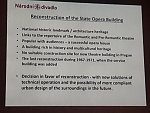
Presentation Narodni Divadlo Prague
The Canada Council for the Arts also strives for international cooperation by promoting the exchange of productions and the appearance of, and above all, European opera companies in Canada. There can be various forms of performance practice, with the motto: “The audience is the driver of change”. Similarly to the study in the USA previously quoted by Marc Scorca, the most important motives for going to the opera are, above all, having fun and being with family and friends, also in connection with “food and beverages” as he termed it. For example, a small Canadian opera company performed “La Bohème” in a bar and is currently touring the country with the project. Another company toured with their opera production on bicycles from city to city.
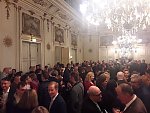
Foyer of Opéra national du Rhin
Then there is another important trend, digitalization. Against the background that Canada has advanced from 15th to 10th place in digitalization worldwide, the Council launched a so-called Digital Strategy Fund. To bring new generations to the opera, you even do opera at home. The ensembles come to a home, where the landlord invites an often wide circle of friends, given the appropriate spatial conditions. “Ariadne on Naxos” comes to mind…
One also thinks of climate change and the requirement not to unnecessarily increase the carbon footprint of opera productions and activities. Finally, there is the Opera in the City, which occurs in renovated industrial buildings. The Theaterfabrik Dresden is something similar. Christine Loewen concludes that the opera of the future must go where it can find partners who support it. The new composers can also play an active role in this.
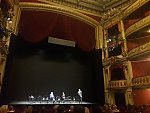
Main Hall of the Opéra national du Rhin
In the “Building Bridges for Culture” panel, various directors participated such as Zach Granit from the Israeli Opera Tel-Aviv-Yafo; Ms. Steinunn Birna Ragnarsdóttir from the Icelandic Opera; David Blackburn, international strategy consultant from Chile (representing Alejandra Martí from OPERA LATINOAMERICA, who could not come because of the political situation in Chile); and Viktor Schoner from the Stuttgart State Opera.
Zach Granit gives two examples of how he tries to build bridges with the Israeli Opera. Every Friday he and his team go to the broad beach in Tel Aviv on the Mediterranean, in the middle of the city, so to speak, and there they run small opera shows with a connection to history. I can easily imagine that this works, because I was in Tel Aviv twice in spring 2019 and saw this beach, populated with all sorts of ethnicities, in an absolute leisure mood. There is definitely a lot to be done there in this regard. Then the Israeli Opera performs an open-air opera at least once a year, mostly in the so-called Sultan's Pool below the walls of the Old City of Jerusalem near the David Tower. Here, too, visitors from all social and ethnic groups in Israel come together and thus also into conversation – building bridges … In addition, there are various educational projects.

Circles of the Opéra national du Rhin
In the “Building Bridges for Culture” panel, various directors such as Zach Granit from the Israeli Opera Tel-Aviv-Yafo; Ms. Steinunn Birna Ragnarsdóttir from the Icelandic Opera; David Blackburn, international strategy consultant from Chile (representing Alejandra Martí from OPERA LATINOAMERICA, who could not come because of the political situation in Chile); and Viktor Schoner from the Stuttgart State Opera.
Zach Granit gives two examples of how he tries to build bridges with the Israeli Opera. Every Friday he and his troop go to the broad beach in Tel Aviv on the Mediterranean, in the middle of the city, so to speak, and there they run small opera shows with a connection to history. I can easily imagine that this works, because I was in Tel Aviv twice in spring 2019 and saw this beach, populated with all sorts of ethnicities, in an absolute leisure mood. There is definitely a lot to be done there in this regard. Then the Israeli Opera performs an open-air opera performance at least once a year, mostly in the so-called Sultan's Pool below the walls of the Old City of Jerusalem near the David Tower. (Report on “Nabucco” in flag 07/2019). Here, too, visitors from all social and ethnic groups in Israel come together and thus also into conversation – building bridges … In addition, there are various educational projects.
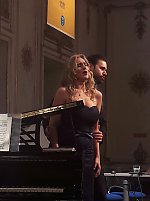
Recital at the Opéra national du Rhin
Steinunn Birna Ragnarsdóttir presents the only and, she thinks, “phantastic concert hall” in Reykjavik, the Harpa Concert Hall of which she is the director, a multi-purpose house that is much more open to the visitor than a large, indeed monumental, opera house in continental Europe. One tries to get into a permanent dialogue with the audience and partners and to give them the feeling of so-called ownership, that is, that they consider the concert hall as theirs and thus participate even more in its program and success. “Otherwise you would literally be alone!” There is also a solid musical education in Iceland. Everyone studies a musical instrument at school. This also makes it easier to reach the children and to discuss with them what should take place in the opera.
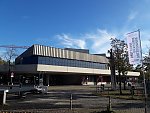
Badisches State Theatre
David Blackburn, a Texan from Weico, who was once a casting director and now lives in southern Italy, works for the Ibánez Atkinson Foundation in Santiago de Chile, building bridges from South America to the whole world. While he is almost constantly on the plane to hear new voices here and there, he is firmly convinced that “to understand the market, you have to hear the market”. And when he has heard one or two singers in South America, North America and Europe, to the point where he has moved him emotionally – because that is his condition – Blackburn can build a little further on this opera bridge …

Experts Panel
Summary and conclusions
Birgitta Svendén, director and artistic director of the Royal Swedish Opera in Stockholm and known not only to the friends of Wagner's oeuvre as a first-class mezzo-soprano (Erda, Fricka et al., also for long in Bayreuth), summarized the deliberations of the conference at the end.
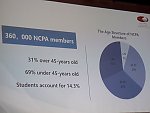
Presentation NCPC Beijing
It became obvious that a lot must change. You will need change, as well as flexibility and closer links to society, i.e. the community in which you operate. A closer connection should also be made to politics. We cannot prove “our relevance”, i.e. the relevance of the opera. Rather, we must look for arguments and explanations for why opera is needed, even in our fast-moving times. The well-known Danish director Kaspar Becht Holten once said: “The opera will survive, but the business model has to change”. Digitalization can be a threat, but it can also be a great tool! It can be a means of contacting and maintaining contact, especially with the younger audience. The opera is ten years back in this field, while pop music has long been digital. Streaming can be a threat to live performances because they are still the most important. People should be able to go to an opera, and also to an opera house. Outside events are of enormous importance, they are also on the rise and are being well received. The Royal Opera in Stockholm is now closed for four years. Thus, you have to come up with something in this area. The Manchester House is a good example in this context.
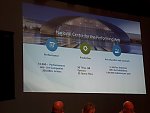
Presentation NCPC Beijing
Today, the young generation may find it too long and boring to sit in an opera for hours, just to watch and listen, so not being able to get involved. Here we have to find solutions to convince them anyway – we have to talk to each other.
Regarding the program, it should be said that we cannot and should not play the same ten titles that are played everywhere. In the long term, a ratio of 50 percent traditional to 50 percent contemporary works should be addressed. But the latter must also be done well. However, a study in the US has shown that young people prefer to go into traditional pieces. There are opportunities in both sectors. So: “diversity in the repertoire, in story telling”. But diversity has several facets. Also, in terms of staff. Everywhere opera management and staff are from the same culture, speak the same language and therefore work well together. But we leave the cultural diversity to the artists – that's where it is. We should also think about that, Birgitta Svendén calls to the audience!

The recreational value of opera
In the field of finance, sustainable and continuous financing of the companies should be sought. We cannot just depend on government subsidies. This underscores the importance of external funding and a lifelong commitment to fund raising and the permanent search for sponsors. We also have to ask ourselves what we can do to convince the sponsors that we are together to promote the opera, that is, sitting in one boat.
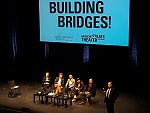
Panel "Building Bridges for Culture"
On climate change, because we cannot avoid addressing it too: Do we really need the many workshops, does everything have to be manufactured in-house? Can't we find other ways to make our productions more carbon neutral?
This meeting brought a lot of good ideas about what to do. But we should have a little more courage to specifically address what and where it is going wrong, where we got lost; because we can and must learn from mistakes. “We have to speed up the tempo on how we would like to be in the future!”

Theatre Factory Dresden, Germany
Old or new, even brand-new houses, there is also a great potential for diversity (Manchester House, new Museum in Helsinki et al.). But that makes no difference to our work. It only matters what we do with the art of opera, what the content is, what concept we have and how we implement it. “We can even make this happen in a crappy old house with little space!”
In conclusion, Birgitta Svendén thanked OPERA EUROPA for the excellent work in arranging this meeting, the participants in the discussion who gave good inputs on these questions and the public who invested their time in Strasbourg and Karlsruhe for three days to discuss the issues at hand. The next OPERA EUROPA conference will be in Helsinki in May 2020.

N. Payne with B. Svendén at the Summary
Lilli Paasikivi, the Artistic Director of the Finnish National Opera (FNO), announced that the next conference in Helsinki at the end of May 2020 will deal with the topic of “Emersive Opera”. The FNO is very busy researching the possibilities of new technologies (Emersive Technologies and Performing Arts) for opera as an art form. Thus, the project “Opera beyond” was created for at least three reasons: 1. You have to develop and update the new technologies for the benefit of operatic art and not replace the old with the new. Technology should always be just a tool. 2. The use of digitalization and planning in the production process, and 3. The use of new technologies to appeal to new visitors and bring them to the opera. Before the actual OPERA EUROPA spring conference, an “Opera beyond” conference will take place on May 25 and 26, a platform for the tech and art professionals, in which the results of the project have been presented to date. There will also be a high-tech project by the partner of the FNO, the conductor and composer Esa-Pekka Salonen, a mixed reality production with extended intelligence, as well as a performance of the new production of the “Walküre”.

N. Payne, B. Svendén, P. Spuhler and L. Paasikivi at the Summary
Final comments by the author
The autumn conference of OPERA EUROPA was an important contribution to addressing and further analyzing the many challenges that opera, as a principally museum-based art form, is currently facing and even more so in the future. It has to do a lot in order to be able to survive the constant competition with other forms of communication of art and to appeal to and interest especially younger people. These are more and more shaped by the communication concept of social media and short messages, which is based on increasingly shorter messages, as well as spots or clips of the smallest possible length on their mobile phones. On the other hand, the opera comes up with unchanged long sessions, including sessions lasting up to six hours with Richard Wagner (including breaks). The opera is, so to speak, an immovable art dinosaur, at least as far as her classic works are concerned. And no communication with the actors is provided and possible during the performance, as in the popular chat exchange – quickly and often/mostly superficially.

P. Spuhler with his team in Karlsruhe
This is precisely where the opera could begin to show a way in which one can regain more intensity in the – quite emotional – experience and perception of fundamental contents of life, including certain values of Western culture. This is a value that plays an important role in the context of the intended growing together of Europe, which is becoming increasingly relevant in view of global political developments and even constraints.
When I walked through the city in Strasbourg on the first evening and looked for the opera house, I asked about five young people who were sitting alone or in groups with their cell phones, where the opera was. Nobody could tell me, and the Opéra nacional du Rhin had just been voted Opera House of the Year. Only an elderly couple with a dog (which is why I immediately associated long-term residency) knew the way there. It can't stay that way, because then the opera may really die due to a lack of visitor interest and then soon also subsidies questioned by the public sector. A friend from Dresden (sic!) recently sent me a photo that shows the auditorium of the Dresdner Semper Oper just one minute before Ligeti's “Le Grand Macabre”. There were around 60 visitors in the stalls and a few more scattered in the stands. In many houses, the upper ranks are no longer opened, at least not the gallery (although it is usually best to hear there …). Thus, we have to seriously think about how to attract a younger audience to the opera despite all the stimuli and dynamics of social media. The conference said something about this. In my opinion it could have been and should have been more!
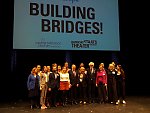
End of the conference
Nothing was said, for example, about the positive impact of opera visits, especially on children and young people, regarding the Code of Ethics. Because art and culture – and especially the opera, which mostly tells stories of life and autobiographical experiences of the composers – has enormous potential to shape young people positively in their social and ethical behavior. Music is the universal language of mankind! “Music is a sacred art” lets Hugo von Hofmannsthal sing the composer in the prelude to Richard Strauss's “Ariadne on Naxos” – and this saying comes very close to reality. Everyone can understand music because it is an emotional form of expression. And no other art can convey human emotions as strongly as music theater and thus has an intensive effect on the right brain, which controls creativity, intuition, emotion and senses for art in general – an elementary complement to the ratio of the left! The music theater simply connects everything: music; singing; visual arts, i.e. architecture, painting, sculpture, et al .; literature; History; autobiographical experience; political content; and so on. No other art form can offer this experience of a total work of art long before Richard Wagner made this concept a creed for his music theater.

Final concert with the Badisches State Orchestra
On the other hand, the intensity of the debates in Karlsruhe about alternative venues and open-air events, also in order to gain new audience potential for the opera, sometimes seemed exaggerated and overly optimistic, even unrealistic. First, open air events can only take place in a maximum of three months a year in the countries in which the art form opera is most cultivated. Before and after it is simply too cold! Then, what in the other nine months?! In addition, I think the many, quite interesting alternative performance venues such as touring opera, opera on wheels, opera at home, in public places, in schools, hospitals and other unconventional places are very interesting. These activities are particularly attractive for the promotion of the art form and thus a potential interest in circles remote from the opera and should in any case (further) be pursued. In my opinion, however, they can never be an alternative to a performance in an opera house. How else could the often and especially high ticket prices at festival, recently even in Bayreuth – contrary to the ideas of its founder Richard Wagner – be explained with a (still) decreasing audience response ?! These alternatives are sensible and exciting add-ons, i.e. additional programs complementary to the actual experience of a performance in the opera house, with the possible but certainly remote effect of attracting new audiences.
And there is more to worry about here. If you move away from the actual opera house with such activities, just to look for and attract new audiences, but the occupancy rate of the house itself drops even further than it is already doing in Germany, you will have to expect considerations from the public subsidy provider to reconsider financial support. And a downward spiral may start relatively easily, especially since the cultural budget is less and less important in the overall public budget than other areas and its reduction therefore hardly promises political damage. Additionally, the politicians assigned to the culture portfolio regrettably tend to act rather marginally and, as recently in Austria, are the last to be appointed for their office, as a kind of left over… The opera subsidies are geared towards the entertainment and artistic production of opera houses that were and are built and renovated at the state's expense. If this basis disappears, the subsidies will decrease or no longer be politically sustainable, at least not at the usual level. And then the disaster is perfect!

Badisches State Orchestra
In this respect, I believe that the title of the panel “Where will tomorrow’s opera take place?” should have been: “Where will/can tomorrow’s opera also take place?” I think it would be fatal to get away from the opera house too much. Instead, we should intensify contact and dialogue with the audience in and around the opera house. This also includes the creation and maintenance of an attractive, varied and high-quality gastronomic offer.
This can – and I think should – include opening First Night partys for the entire audience, in which the director introduces the singers and the leading team and where you can talk to them and a paid or free catering takes place. I experienced that again last autumn at the Stuttgart State Opera and at the Salzburg State Theater in the Felsenreitschule. When Stefan Soltész, the well-known Austrian conductor, was director of the Essen Aalto Opera, free beer was always available at the First Night party. This practice was maintained there after his departure. At the LT Salzburg at its “Lohengrin” First Night in November 2019, there was a glass of sparkling wine at the beginning of the Fiest Night party designed for actors and the public in the Karl Böhm Hall when the director introduced all the protagonists, and even later a simple free but sufficient buffet was served.
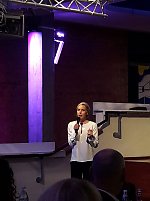
Opera director of Karlsruhe Nicole Braunger
The First Night parties for invited guests are held on the backstage at the Vienna State Opera. The paying audience is meant to go home immediately after the performance and the applause. I sincerely think the new management of the Vienna State Opera should rethink this issue in view of the considerations of the OPERA EUROPA Autumn Conference presented here, the US study mentioned at the beginning. To do this, however, the State Opera's catering concept would have to be completely revised and enriched – also qualitatively – especially if you think of five and a half hour Wagner evenings that begin at 5 p.m. and end with applause well after 10 p.m. The normal visitor usually has had dinner by then, which he does not have though before 5 p.m., but often also has no time to take a snack. And with coffee and cake in your stomach, you can't sit for long anyway.
In this context, it is completely incomprehensible that it has now been decided not to renew the contract for the so popular (see above – sic!) Opera Café, even though it was or will only have been a café and not even a restaurant. If the new concept for this venue does not include a gastronomic establishment, ideally a restaurant for an hour or two after the performance and/or and a coffee or drink before, I believe the above-mentioned study on visitor motivation would be seriously disregarded. The possible counterargument that the State Opera is always 98-99 percent full anyway (the number of not fully paying visitors is always included) should not apply in my opinion, especially since this does not necessarily have to be the case forever. Even the Bayreuth Festival has long not been fully sold out anymore, apart from the yearly new production, a situation unthinkable some 15 years ago still. One could also calculate and then publish how full the Vienna State Opera is still at the end of performance … And it is often the full payers who like to sit together for a late dinner after an opera evening and exchange their opinions.
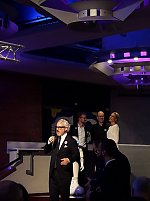
Peter Spuhler, General Director of Badisches State Theatre Karlsruhe
It would also be an opportunity to say that it would be better if the ushers in the stalls of the Vienna State Opera increasingly guided the visitors to their seats, especially those who do not yet know the house – and these are often foreigners who can afford the prices – instead of noting empty seats on a piece of paper before the start of the show. The instruction to help to the seats is common in other large and medium-sized houses, especially in the United States, Latin America and France as well as in Southern Europe, often in connection with the handover of the free program sheet – for a tip. Instead of control, there should be trust and courtesy, especially since we are all “in the same boat”, as Birgitta Svendén said in her closing remarks.
I also believe that the practice of showing live operas from major cinemas such as the Met and London Covent Garden in cinemas, which has become more widespread since it started at the Metropolitan Opera in New York, does not necessarily help, even in movie theaters that may be busy, to lure more audiences far away from the opera into the houses. On the one hand, many of them will say that they are already there for a much lower price, on a comfortable cinema armchair and without having to “dress up”. On the other hand, the cinematic performance practice helps all those who are interested, but fear of contact when visiting an opera, fear of high prices (although it is often possible to sit up from € 10, but this is largely unknown due to the lack of effective communication between the houses and the potential audience). Or they have other reservations about enjoying the art form opera live in an opera house. At any rate, the Met's occupancy rate has not risen since the introduction of its film program, rather it has fallen, which may be partly because of it. And I have ever more the impression that the Met productions are more and more staged from the camera perspective than from the viewer perspective in-house, which means that the film revenue is very important. But the art form opera was created by its creators, the composers and librettists, for the people who want to experience it live in an opera house. On the other hand, it always depends on what and/or which composer is played – and how. This was not dealt with in the relevant panels, although it is highly relevant. If Wagner, also Richard Strauss, is shown, every house is usually sold out long in advance, just as big “hits” like “Tosca”, “La traviata”, “La Bohème”, “Madama Butterfly” or “Carmen” if played with good castings. Thus, that is also a factor.
Finally, it also seems relevant to me to briefly consider the increasingly rapid use of video and film in opera productions. As for the film, which is often hidden in the program under the term “video”, I have the impression more and more that I am sitting in a cinema instead of an opera house. The growing performance of live operas in cinemas just mentioned may have contributed to this. However, I believe the potential of the film to depict opera material is increasingly reaching its limits, even though it can be a substantial enrichment if it is dosed well and in a dramaturgically sensible manner. But it is an aspect that should also be considered in the discourse on the future of opera as a prominent form of music theater. I deposited this in the panel “The Value of Opera in Society” in a short contribution that was not taken up any further. However, I find it completely impossible if a camera team constantly roams around on the stage to film live recordings of the events on overhead screens, as if one could only perceive and understand it then. That seems too much to me of the cinematic “Zeitgeist” of our increasingly visual society …
Perhaps some of these additional considerations can be taken up in a future seminar on the future of the opera as an art form, when the corona crisis has gone by, which we all hope of course. Opera is probably the greatest art form and thus deserves utmost attention, even under adverse conditions!
Fotos: Klaus Billand
Klaus Billand









